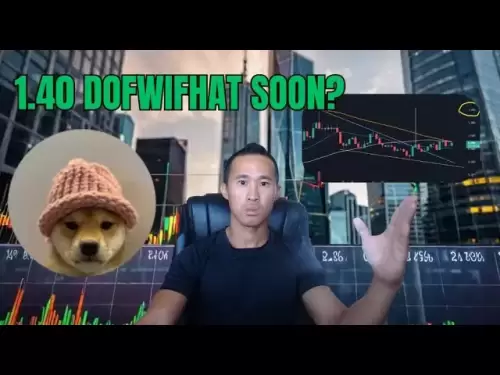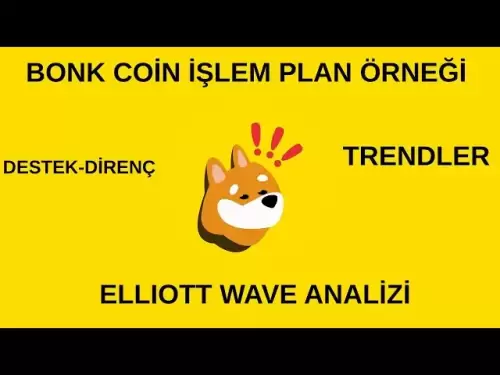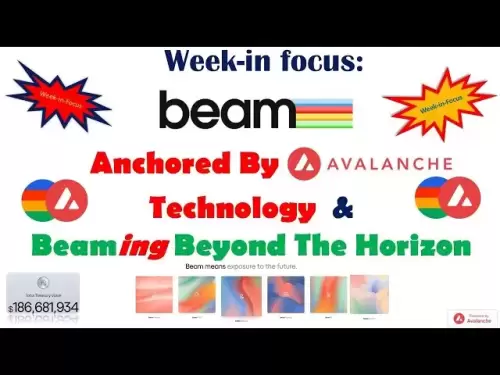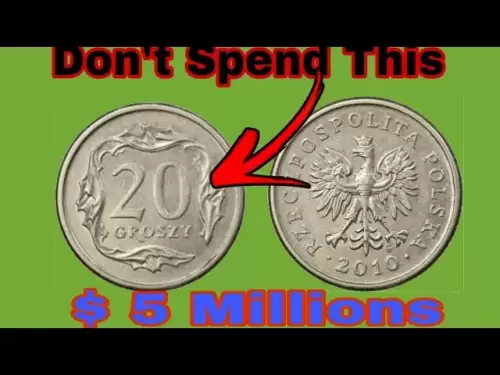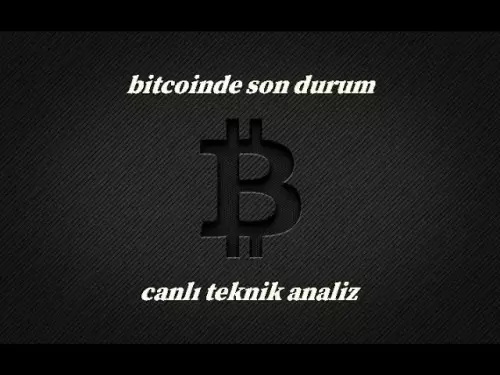-
 Bitcoin
Bitcoin $108,562.4295
0.46% -
 Ethereum
Ethereum $2,533.9553
1.52% -
 Tether USDt
Tether USDt $1.0002
-0.01% -
 XRP
XRP $2.2542
2.23% -
 BNB
BNB $662.4567
1.48% -
 Solana
Solana $151.4114
3.48% -
 USDC
USDC $0.9999
0.00% -
 TRON
TRON $0.2860
0.91% -
 Dogecoin
Dogecoin $0.1685
3.72% -
 Cardano
Cardano $0.5809
1.63% -
 Hyperliquid
Hyperliquid $39.2916
1.85% -
 Sui
Sui $2.8874
0.85% -
 Bitcoin Cash
Bitcoin Cash $496.5801
2.72% -
 Chainlink
Chainlink $13.3582
2.48% -
 UNUS SED LEO
UNUS SED LEO $9.0279
0.07% -
 Avalanche
Avalanche $18.0773
2.30% -
 Stellar
Stellar $0.2426
3.05% -
 Toncoin
Toncoin $2.9086
6.01% -
 Shiba Inu
Shiba Inu $0.0...01170
2.97% -
 Hedera
Hedera $0.1587
3.47% -
 Litecoin
Litecoin $87.4596
1.13% -
 Monero
Monero $317.0425
0.73% -
 Polkadot
Polkadot $3.3778
1.90% -
 Dai
Dai $0.9999
-0.01% -
 Ethena USDe
Ethena USDe $1.0001
-0.01% -
 Bitget Token
Bitget Token $4.4095
0.63% -
 Uniswap
Uniswap $7.3593
6.80% -
 Pepe
Pepe $0.0...09910
3.64% -
 Aave
Aave $274.7388
2.68% -
 Pi
Pi $0.4607
0.48%
Which exchanges are Toshi (TOSHI) coins listed on?
Low-cap cryptocurrency Toshi (TOSHI) faces risks such as high volatility and limited liquidity, accessible primarily via decentralized exchanges like Uniswap and smaller centralized exchanges like Hotbit and ZT Exchange.
Jan 07, 2025 at 04:42 am
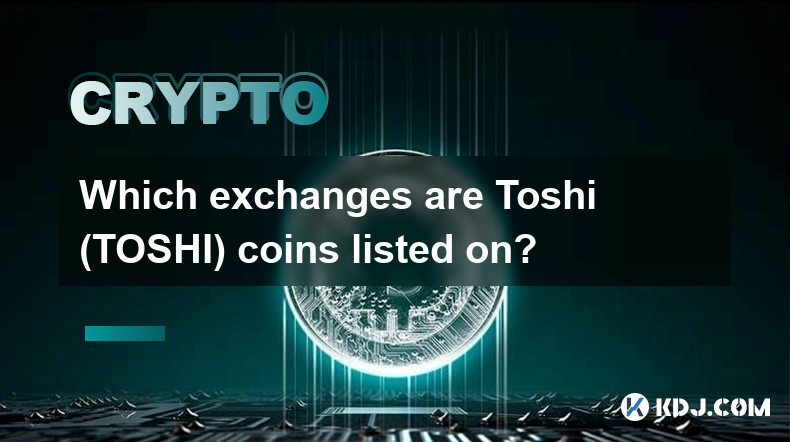
Key Points:
- Toshi (TOSHI) is a low-cap cryptocurrency not listed on major exchanges.
- It is currently traded on a limited number of small and decentralized exchanges.
- Potential risks associated with trading low-cap cryptocurrencies.
Exchanges Listing Toshi (TOSHI) Coins:
1. Uniswap (Decentralized):
- Uniswap is a decentralized exchange that allows users to trade cryptocurrencies directly with each other without the need for intermediaries.
- It is the primary exchange where TOSHI is actively traded.
- Known for its deep liquidity and user-friendly interface.
2. Hotbit (Centralized):
- Hotbit is a centralized cryptocurrency exchange.
- It offers a wide range of trading pairs, including TOSHI/USDT.
- Known for its low trading fees and fast order execution.
3. ZT Exchange (Centralized):
- ZT Exchange is a centralized cryptocurrency exchange with a global presence.
- It supports a variety of cryptocurrencies, including TOSHI.
- Features advanced charting tools and margin trading capabilities.
4. Bitrue (Centralized):
- Bitrue is a centralized cryptocurrency exchange focusing on security and ease of use.
- It lists TOSHI against multiple fiat currencies, including USD and EUR.
- Offers additional features such as staking and lending rewards.
Risks of Trading Low-Cap Cryptocurrencies:
- High Volatility: Low-cap cryptocurrencies are highly susceptible to price fluctuations, making them risky investments.
- Limited Liquidity: Smaller exchanges may have lower liquidity, leading to wider spreads and difficulty in executing trades.
- Potential Scams: Less-known exchanges and cryptocurrencies are more prone to fraudulent activities, including scams and pump-and-dump schemes.
- Lack of Regulation: Low-cap cryptocurrencies may not be subject to regulatory oversight, increasing the risk of manipulation and market abuse.
FAQs:
Q: Why is TOSHI not listed on major exchanges like Binance or Coinbase?
A: Low-cap cryptocurrencies typically require a high level of trading volume and liquidity to qualify for listing on major exchanges. Toshi's limited trading volume has hindered its inclusion on these platforms.
Q: Is it safe to trade TOSHI on the listed exchanges?
A: While the exchanges mentioned have varying levels of security, it is important to conduct thorough research and exercise caution when trading any low-cap cryptocurrency.
Q: How do I buy TOSHI?
A: Create an account on an exchange that supports TOSHI trading. Fund your account and follow the exchange's instructions to purchase TOSHI. Utilize a decentralized wallet for secure storage.
Disclaimer:info@kdj.com
The information provided is not trading advice. kdj.com does not assume any responsibility for any investments made based on the information provided in this article. Cryptocurrencies are highly volatile and it is highly recommended that you invest with caution after thorough research!
If you believe that the content used on this website infringes your copyright, please contact us immediately (info@kdj.com) and we will delete it promptly.
- Coin-Flipping Chaos: A Look at Pokémon TCG's Luckiest (and Riskiest) Cards & Deck Ranking
- 2025-07-07 05:10:12
- Crypto Coins, DEXTools, and the Trending Triumvirate: Jupiter, Kamino, and Wormhole
- 2025-07-07 05:10:13
- Ethereum's Evolution: Gas Limits, Vitalik Buterin, and the Institutional Embrace
- 2025-07-07 05:30:12
- Pepe Coin vs. LILPEPE: Price Predictions and the Future of Meme Coins
- 2025-07-07 05:35:13
- Litecoin, HBAR, and Altcoins: Navigating the Crypto Landscape in 2025
- 2025-07-07 04:30:13
- CZ, TON, and the UAE Golden Visa: Is It Too Good to Be True?
- 2025-07-07 05:40:12
Related knowledge

How to customize USDT TRC20 mining fees? Flexible adjustment tutorial
Jun 13,2025 at 01:42am
Understanding USDT TRC20 Mining FeesMining fees on the TRON (TRC20) network are essential for processing transactions. Unlike Bitcoin or Ethereum, where miners directly validate transactions, TRON uses a delegated proof-of-stake (DPoS) mechanism. However, users still need to pay bandwidth and energy fees, which are collectively referred to as 'mining fe...

USDT TRC20 transaction is stuck? Solution summary
Jun 14,2025 at 11:15pm
Understanding USDT TRC20 TransactionsWhen users mention that a USDT TRC20 transaction is stuck, they typically refer to a situation where the transfer of Tether (USDT) on the TRON blockchain has not been confirmed for an extended period. This issue may arise due to various reasons such as network congestion, insufficient transaction fees, or wallet-rela...

How to cancel USDT TRC20 unconfirmed transactions? Operation guide
Jun 13,2025 at 11:01pm
Understanding USDT TRC20 Unconfirmed TransactionsWhen dealing with USDT TRC20 transactions, it’s crucial to understand what an unconfirmed transaction means. An unconfirmed transaction is one that has been broadcasted to the blockchain network but hasn’t yet been included in a block. This typically occurs due to low transaction fees or network congestio...

How to check USDT TRC20 balance? Introduction to multiple query methods
Jun 21,2025 at 02:42am
Understanding USDT TRC20 and Its ImportanceUSDT (Tether) is one of the most widely used stablecoins in the cryptocurrency market. It exists on multiple blockchain networks, including TRC20, which operates on the Tron (TRX) network. Checking your USDT TRC20 balance accurately is crucial for users who hold or transact with this asset. Whether you're sendi...

What to do if USDT TRC20 transfers are congested? Speed up trading skills
Jun 13,2025 at 09:56am
Understanding USDT TRC20 Transfer CongestionWhen transferring USDT TRC20, users may occasionally experience delays or congestion. This typically occurs due to network overload on the TRON blockchain, which hosts the TRC20 version of Tether. Unlike the ERC20 variant (which runs on Ethereum), TRC20 transactions are generally faster and cheaper, but during...

The relationship between USDT TRC20 and TRON chain: technical background analysis
Jun 12,2025 at 01:28pm
What is USDT TRC20?USDT TRC20 refers to the Tether (USDT) token issued on the TRON blockchain using the TRC-20 standard. Unlike the more commonly known ERC-20 version of USDT (which runs on Ethereum), the TRC-20 variant leverages the TRON network's infrastructure for faster and cheaper transactions. The emergence of this version came as part of Tether’s...

How to customize USDT TRC20 mining fees? Flexible adjustment tutorial
Jun 13,2025 at 01:42am
Understanding USDT TRC20 Mining FeesMining fees on the TRON (TRC20) network are essential for processing transactions. Unlike Bitcoin or Ethereum, where miners directly validate transactions, TRON uses a delegated proof-of-stake (DPoS) mechanism. However, users still need to pay bandwidth and energy fees, which are collectively referred to as 'mining fe...

USDT TRC20 transaction is stuck? Solution summary
Jun 14,2025 at 11:15pm
Understanding USDT TRC20 TransactionsWhen users mention that a USDT TRC20 transaction is stuck, they typically refer to a situation where the transfer of Tether (USDT) on the TRON blockchain has not been confirmed for an extended period. This issue may arise due to various reasons such as network congestion, insufficient transaction fees, or wallet-rela...

How to cancel USDT TRC20 unconfirmed transactions? Operation guide
Jun 13,2025 at 11:01pm
Understanding USDT TRC20 Unconfirmed TransactionsWhen dealing with USDT TRC20 transactions, it’s crucial to understand what an unconfirmed transaction means. An unconfirmed transaction is one that has been broadcasted to the blockchain network but hasn’t yet been included in a block. This typically occurs due to low transaction fees or network congestio...

How to check USDT TRC20 balance? Introduction to multiple query methods
Jun 21,2025 at 02:42am
Understanding USDT TRC20 and Its ImportanceUSDT (Tether) is one of the most widely used stablecoins in the cryptocurrency market. It exists on multiple blockchain networks, including TRC20, which operates on the Tron (TRX) network. Checking your USDT TRC20 balance accurately is crucial for users who hold or transact with this asset. Whether you're sendi...

What to do if USDT TRC20 transfers are congested? Speed up trading skills
Jun 13,2025 at 09:56am
Understanding USDT TRC20 Transfer CongestionWhen transferring USDT TRC20, users may occasionally experience delays or congestion. This typically occurs due to network overload on the TRON blockchain, which hosts the TRC20 version of Tether. Unlike the ERC20 variant (which runs on Ethereum), TRC20 transactions are generally faster and cheaper, but during...

The relationship between USDT TRC20 and TRON chain: technical background analysis
Jun 12,2025 at 01:28pm
What is USDT TRC20?USDT TRC20 refers to the Tether (USDT) token issued on the TRON blockchain using the TRC-20 standard. Unlike the more commonly known ERC-20 version of USDT (which runs on Ethereum), the TRC-20 variant leverages the TRON network's infrastructure for faster and cheaper transactions. The emergence of this version came as part of Tether’s...
See all articles





















